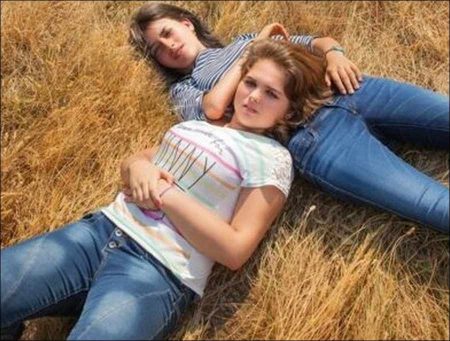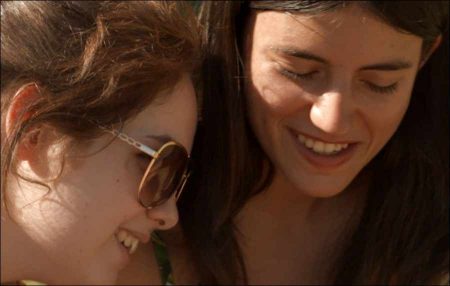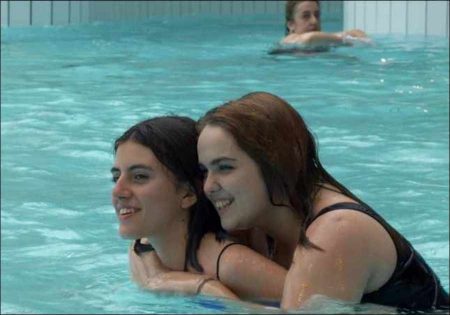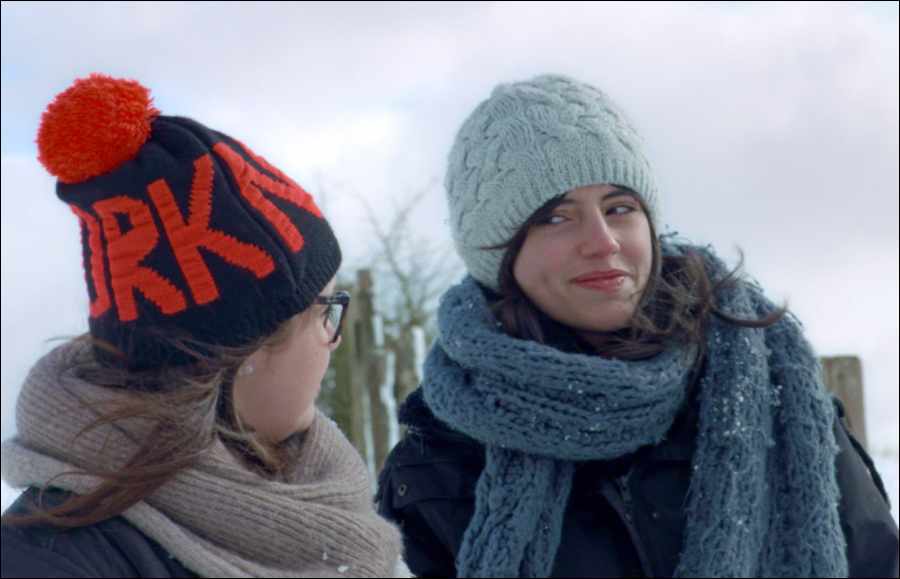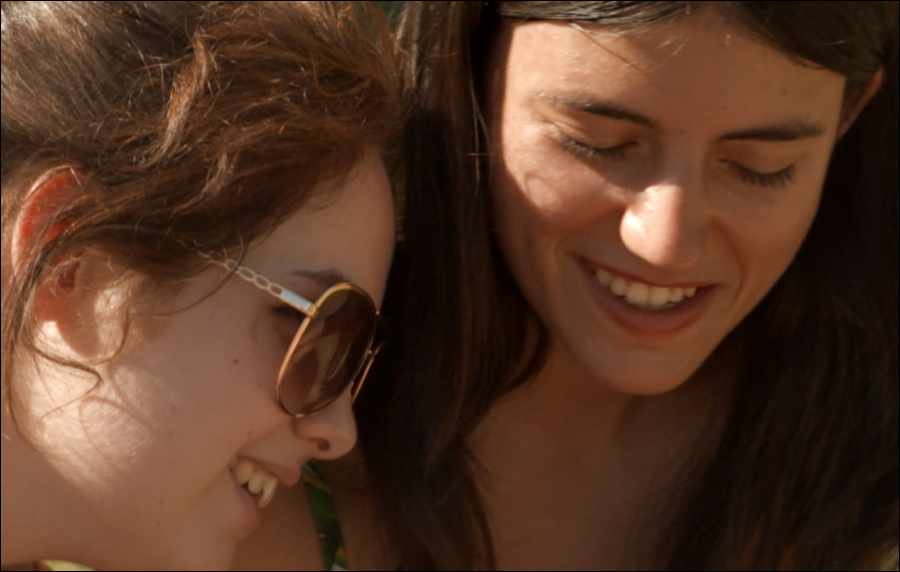Adolescents movie storyline. Born in a small, provincial French town, Anaïs and Emma have been best friends since childhood. It’s a friendship that’s blind to differences in social backgrounds and character. Given incredible access, Sébastien Lifshitz painstakingly filmed Emma and Anaïs’ transformation over the years, during a period when their physical, emotional and intellectual development is dramatic.
We first meet them aged 13, their lives are dominated by boys, teachers and arguing with their mums. But as we witness them near adulthood, their journey is both fascinating and surprisingly moving. At the same time, the influence of their environment and family circumstances becomes increasingly apparent. New experiences, everyday conversations and events both personal and political anchor the film, creating a uniquely textured and deeply personal portrait of two young French women.
Adolescents (French: Adolescentes) is a 2019 French documentary directed by Sébastien Lifshitz. It was theatrically released in France on 9 September 2020. The film received the Louis Delluc Prize for 2020 and was awarded Best Documentary Film, Best Sound and Best Editing at the 46th César Awards.
Adolescents had its world premiere in the Critics’ Week section at the 72nd Locarno Film Festival on August 9, 2019.The film was later screened on October 16, 2019 at the Festival International du Film Indépendant de Bordeaux. Postponed due to the COVID-19 pandemic, the film was theatrically released in France by Ad Vitam on 9 September 2020.
Film Review for Adolescents
If 2020 was not exactly a banner year for art-house cinema, with festivals either cancelled or relegated to online status and theatrical releases postponed or demoted to streaming sites, this was not necessarily the case for French filmmaker Sébastien Lifshitz, who managed to put out two of his best works by December: the feature documentaries Little Girl and Adolescents, both of which saw distribution and critical acclaim at home.
The former, a bracing portrait of a French trans child named Sasha, born a boy but convinced by the age of 3 that she was a girl, premiered in Berlin back in February (in the last major festival to take place before the pandemic struck) and then played to record audiences on pubcaster/co-producer Arte, which aired it earlier this month.
A graceful and very real portrait of growing up.
Adolescents, which premiered in Locarno this past summer (in a festival that was a hybrid of online and local screenings), was released theatrically in early September, scoring nearly 100,000 admissions before French cinemas shuttered in late October. It was supposed to be re-released in mid-December along with several other titles, but then the theaters, which were scheduled to open, never did. Meanwhile, a retrospective of Lifshitz’s documentaries at the Centre Pompidou in Paris, following a show of his amateur photo collection held at the museum in 2019, was also cancelled.
For those who had the chance to see Adolescents on the big screen — this reviewer had to resort to an online link — it must have been a truly rewarding experience. Shot in gorgeously lit widescreen by DPs Antoine Parouty and Paul Guilhaume, the film looks more like a full-fledged fictional feature than a documentary, capturing moments of aesthetic bliss in the lives of two teenage girls, Anaïs and Emma, whom Lifshitz followed for five years, from junior high up through their baccalaureate exams.
Comparisons to Richard Linklater’s 12-yearong narrative Boyhood are evident, and there are times when Adolescents seems like it could have been staged as well, whether it’s the drama Lifhsitz manages to sift out of these true stories or the way he films them so poetically. Per the press notes, the director chronicled his subjects over several two-to-three day visits throughout the five-year-period, working with editor Tina Baz (The Edge of Democracy) to whittle down 500 hours of rushes to 135 minutes.
Unlike in his LGBTQ-themed docs (The Invisibles, Bambi, The Lives of Thérèse), sexuality is less central to the lives on display this time, even if it lingers in the background and sometimes pops up into the foreground. After all, this is a film about teens growing up in the picturesque if rather dull rural enclave of Brive-la-Gaillarde, in south-central France, where they partake in the same rituals of so many girls their age: dating boys, losing their virginity and spending inordinate amounts of time on their phones.
Yet as much as the characters in Adolescents each go through the throes of sexual discovery in their own way, the film is much more a tale of two very different families living in the same city: Anaïs’ is poor and problem-ridden; Emma’s rich (or else comfortably bourgeois) and stifled.
What’s most telling about Lifshitz’s depiction of these dual trajectories is the way it reveals how social status, especially in a somewhat rigidly class-structured country like France, winds up playing such a pivotal role in each girl’s fate, assuring they will have very divergent futures but never guaranteeing which one of them will be happier.
Indeed, if Anaïs, whose working-class parents face untold hardships, including a fire that destroys their home and a medical emergency that puts her mother in a coma, is definitely the unluckier of the pair, she doesn’t show it often. Forced at a young age to fend for herself, as well as to take care of her baby brother, she opts for a vocational high school that will put her on an early career path — to become a caregiver for either children or senior citizens — and moves out of the house in order to finish her studies.
As difficult as that sounds, Anaïs is constantly surrounded by friends, has at least one major boyfriend with whom she breaks up, resulting in much heartache, and has a seriously active social life that sometimes gets in the way of her school work. But by the time she’s ready to graduate, she already seems like an adult — one who appears to be more mature than her parents, especially her emotionally unbalanced mother.
Emma, on the other hand, has everything a girl needs to get by, at least on the surface: a beautiful home nestled in the countryside, a mother who’s constantly on top of her about homework — this is the source of much contention between them, as well as many of the film’s more hilarious fight scenes — and a Teen Vogue-style face and figure that could prove helpful in her quest to becoming an actress. (In contrast, Anaïs battles with weight issues on and off throughout the movie.)
And yet, Emma may be one of the sulkiest teenagers ever seen on screen. (The French expression for sulking, which is to faire la gueule — literally “to make the face” — seems appropriate in her case.) She never seems happy with anything, especially her mom, who, granted, is ultra annoying and highly disapproving, constantly criticizing Emma’s every move, yet doesn’t seem deserving of the wrath her daughter unleashes upon her. And while Emma has a few friends with whom she sometimes goes clubbing, she doesn’t seem to want a boyfriend and views sex as something she needs to do without being able to enjoy. “I don’t like being touched,” she revealingly says at one point.
Lifshitz never passes judgement on either girl — far from it. But his film does have you draw your own conclusions about two people who let him into their lives for so long, capturing some very dark moments, some very pleasant ones and the kind of mundanity that we all live with from day to day.
Adolescents also steps back to reveal the bigger events that will shape its subjects throughout these pivotal years, especially the Charlie Hebdo and Bataclan terrorist attacks, whose ripple effects were felt throughout France. When the 2017 presidential elections roll their way, Anaïs and her dad are fully behind far-right candidate Marine Le Pen, while Emma’s parents support centrist (or whatever you want to call him) favorite Emmanuel Macron, further underlining how far apart their worlds are.
If Anaïs ultimately suffers much more trauma than Emma throughout the film, she also seems to have blossomed into a fully grown woman by the time she’s 18 and heads off to Limoges to continue her work-study program. Emma, who’s been coddled at home and often looks quite lonely — there’s a telling sequence of her skateboarding solo through the empty streets of Brive — seems to have a lot more growing to do by the end, when she makes her way to Paris.
And yet what the two have in common, beyond the late scenes they spend together reminiscing about their junior high school days, even as they’re lives have become almost diametrically opposed, is what they’ve each managed to lose along the way to adulthood. Whether joyful like Anaïs or a bit stolid like Emma, their faces have hardened by the time they’re ready to go their separate ways, as if they’ve finally begun to realize what life is all about. Lifshitz portrays these last moments spent together with a mix of melancholy and grace, which is as good a definition of adolescence as any.
Adolescents (2020)
Adolescentes
Directed by: Sébastien Lifshitz
Starring: Anaïs Chambaudie, Emma Jaubert
Screenplay by: Muriel Meynard
Production Design by: Pierre Huot
Cinematography by: Paul Guilhaume, Antoine Parouty
Film Editing by: Tina Baz
Music by: Tindersticks
MPAA Rating: None.
Distributed by: Ad Vitam
Release Date: August 9, 2019 (Locarno), September 9, 2020 (France
Views: 40
